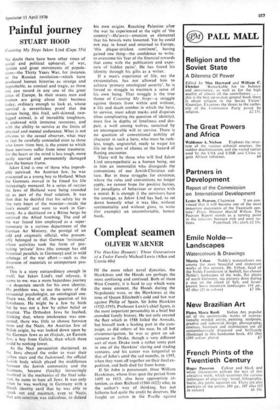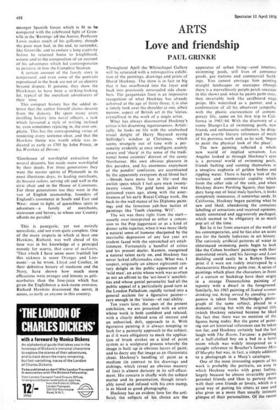Compleat seamen
OLIVER WARNER
The Hawkins Dynasty: Three Generations of a Tudor Family Michael Lewis (Allen and Unwin 60s) Of the more select naval dynasties, the Hawkinses and the Hoods are perhaps the most confusing and confused. Both of them West Country, it is hard to say which were the more eminent, the Hoods during the Napoleonic wars, or the Hawkinses at the time of Queen Elizabeth's cold and hot war against Philip of Spain. Sir John Hawkins (1532-1595), Professor Lewis's chief figure, is the most important personality in a brief but crowded family history. He not only created the fleet which in 1588 foiled the Armada, but himself took a leading part in the cam- paign, as did others of his race. In all but circumnavigation, he was as great an ad- venturer as Drake, though a very different sort of man. Drake took a rather sorry part in one of the Hawkins' slaving and trading ventures, and his career was tangential to that of John's until the sad months, in 1595, when they went off together on their final ex- pedition, and both died far from home.
If Sir John is paramount, three William Hawkinses, whose lives span the period from 1495 to 1613, also have appropriate at- tention, as does Richard (1560-1622) who, to the author's way of thinking, has not hitherto had quite the credit he deserves. He fought an action in the Pacific against
stronger Spanish forces which is fit to be compared with the celebrated fight of Gren- ville in the 'Revenge' off the Azores. Professor Lewis makes much of his gallantry, though the poor man had, in the end, to surrender, like Grenville, and to endure a long captivity before he returned home to knighthood, esteem and to the composition of an account of his adventures which led contemporaries to perceive in him the Compleat Seaman.
A certain amount of the family story is conjectural, and even some of the portraits reproduced in the book are not of an identity beyond dispute. If genuine, they show the Hawkinses to have been a striking-looking lot, typical of the merchant adventurers of their time.
This compact history has the added in- terest that the author himself claims descent from the dynasty. He spent many years instilling history into naval officers, a task which favoured a style of writing inclined to, even sometimes rejoicing in, the over-em- phatic. This has the corresponding virtue of rendering every sentence clear, and that the Hawkins theme was worth while was in- dicated as early as 1701 by John Prince, in his Worthies of Devon: 'Gentlemen of worshipful extraction for several descents, but made more worshipful by their deeds. For three generations they were the master spirits of Plymouth in its most illustrious days; its leading merchants, its bravest sailors, serving oft and well in the civic chair and in the House of Commons. For three generations too they were in the van of English seamanship, founders of England's commerce in South and East and West: stout to fight, of quenchless spirit in adventure—a family of merchants, statesmen and heroes, to whom our Country affords no parallel.'
This is panegyric, yet not entirely unrealistic, and not even quite complete. One of the many respects in which at least one Hawkins, Richard, was well ahead of his time was in his knowledge of a principal remedy for scurvy, that curse of seafarers. 'That which I have scene most fruitfull for this sickness is soure Oranges and Lim- mons'—so he wrote. Lloyd and Coulter, in their definitive history of medicine and the Navy, have shown how much more efficacious were oranges and lemons as anti- scorbutics than the lime-juice which has given the Englishman a nick-name overseas. Richard Hawkins discovered the secret, it seems, as early as anyone in this country.







































 Previous page
Previous page